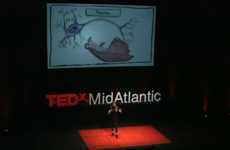
Need Inspiration?
Get inspired by 4,000+ keynote speaker videos & our founder, a top keynote speaker on innovation.
Ella Al-Shamahi Talks About Exploring Hostile and Unstable Areas
Grace Mahas — November 1, 2019 — Keynote Trends
Ella Al-Shamahi, a palaeoanthropologist who focuses on fossil hunting, recently gave a talk about the need to explore hostile and disputed areas further. There's a huge area of the world that the scientific community has deemed too dangerous to explore, and Al-Shamahi refers to this as "science's geography problem."
As an undergraduate student, Al-Shamahi always wondered why scientists theorized that from Ethiopia, humans migrated to Saudi Arabia rather than cross the small channel between Ethiopia and Yemen. The answer to this question is unresolved since Yemen, in comparison to Europe, is incredibly understudied; so much so that Ella Al-Shamahi referred to it as "near virgin territory." This is largely due to its unstable political climate that limited the number of researches able to explore the area. This was not a deterrent to Al-Shamahi who, herself, has Yemen heritage. Eventually, Al-Shamahi went to Socotra, a small island part of Yemen, that's known as one of the most biologically diverse places on Earth. It's described as being "the most alien place on Earth" and boasts an array of unique species. She speaks to the hidden secrets about humanity's story that lie buried and undiscovered in its landscape.
To conclude, Al-Shamahi compares the hypocrisy of scientists beings allowed to do research in the depths of the jungle and in Outerspace, but not in parts of the world like Yemen. She asks us to reconsider these "unexplorable" parts of the world and not limit the scientists who are trained and aware of the dangers. She urges these scientists to work with local academics to learn more and closes by stating: "These places deserve a narrative of hope [and pride] and science can be apart of that."
As an undergraduate student, Al-Shamahi always wondered why scientists theorized that from Ethiopia, humans migrated to Saudi Arabia rather than cross the small channel between Ethiopia and Yemen. The answer to this question is unresolved since Yemen, in comparison to Europe, is incredibly understudied; so much so that Ella Al-Shamahi referred to it as "near virgin territory." This is largely due to its unstable political climate that limited the number of researches able to explore the area. This was not a deterrent to Al-Shamahi who, herself, has Yemen heritage. Eventually, Al-Shamahi went to Socotra, a small island part of Yemen, that's known as one of the most biologically diverse places on Earth. It's described as being "the most alien place on Earth" and boasts an array of unique species. She speaks to the hidden secrets about humanity's story that lie buried and undiscovered in its landscape.
To conclude, Al-Shamahi compares the hypocrisy of scientists beings allowed to do research in the depths of the jungle and in Outerspace, but not in parts of the world like Yemen. She asks us to reconsider these "unexplorable" parts of the world and not limit the scientists who are trained and aware of the dangers. She urges these scientists to work with local academics to learn more and closes by stating: "These places deserve a narrative of hope [and pride] and science can be apart of that."
2.5
Score
Popularity
Activity
Freshness
















